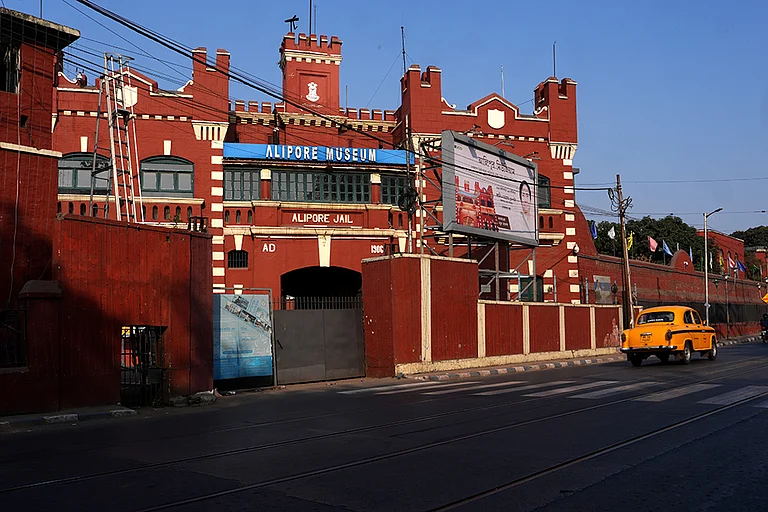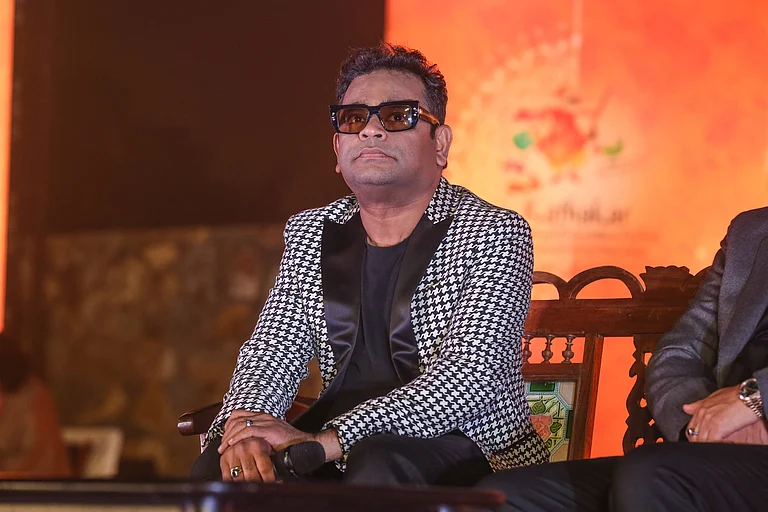1) Syed Mojibur Rahman: A key figure from Bihar, in the freedom struggle of 1947.
“To hold a pen is to be at war," said Voltaire. The pen here becomes a weapon in the battle, capable of influencing minds, shaping societal dynamics, and capable of challenging injustice and oppression. This statement aptly captures the profound influence Syed Mojibur Rahman had on India’s struggle for freedom. Through his hard work and dedication in the struggle for independence, he used his sagacity to instill a sense of patriotism in the town of Islampur, Bihar. As an educator and a social activist, he tirelessly worked to sow the seeds of nationalism in his community, leading to the formation of dedicated groups of freedom fighters, including Professor Sidheshwar Prasad (former Governor of Tripura and former MP) and Ram Sharan Prasad (former MLA of Islampur, Bihar) who also played their part in the struggle of independence in 1947.
Known affectionately as Majju Sahib, Rahman was born in 1905 in Shaho Bigha, a village erstwhile in Gaya district of Bihar and now in Jehanabad, Bihar. Despite coming from a not-so-affluent family, his mother, Rasool Bandi (daughter of Mir Mohammad Baksh of Shehbazpur, Jehanabad) sold her jewelry for her son’s studies. She enrolled him in T.K. Ghosh Academy, Patna for his schooling, then Patna College, Patna and later in Aligarh Muslim University (AMU), Aligarh, for higher studies. He was accompanied by Syed Abdul Majeed Shams Azimabadi, the founding principal of the College of Commerce, Patna, Bihar.

Left-Right: Syed Mojibur Rahman alias 'chote majju', with Dr. Syed Abdul Majeed Shams Azimabadi alias 'bade majju', founding Principal, College of Commerce, Patna)
Rahman was the grandson of Syed Ali, who participated in the Revolt of 1857, the first major uprising in India’s struggle for independence against colonial rule. This historical connection and his dedication to the country fueled his involvement in the independence movement, leading to significant contributions that shook the British Empire during the independence struggle to its very foundations.
Role in Non Cooperation Movement
Rahman played a pivotal role in mobilizing the Hindu and Muslim communities for the freedom struggle. He was instrumental in bringing prominent figures such as Abadi Bano Begum, the mother of Maulana Mohammad Ali Jauhar and Shaukat Ali, to Islampur during her visit to Bihar in the year 1922. By rallying the Muslim populace, he significantly accelerated the momentum of the independence movement. Behind the scenes, he consistently motivated and supported freedom fighters, bolstering their resolve.
From 1920 to 1922, he traveled extensively across villages adjoining Islampur, like Ekangar sarai and Hilsa (south of Islampur), Dhobdiha, Khudaganj (northeast of Islampur) spreading the message of patriotism and inspiring many to join the freedom movement. His efforts kindled the spirit of revolution in every corner of Islampur, making him a key figure in rallying support for the cause. He traveled extensively across villages, spreading the message of ‘self-reliance’ by spinning khadi, buying only Indian-made goods, and boycotting British goods. He propagated Gandhi’s message of refusing to contribute their labor for anything that supported the British government and also the economy including British industries and educational institutions run by them.
A Tale of Bravery in the Quit India Movement, 1942
The Quit India Movement, launched by Mahatma Gandhi on August 8th, 1942 against British rule, had a profound impact on the southern parts of Bihar including Gaya, Jehanabad and Islampur. The agitation activities began in Jehanabad district. Starting from 10 August 1942 people from rural areas began congregating in towns such as Makhdumpur, Tehta, Ghosi, Hulasganj, and Kako, as well as in Jehanabad city.
To prevent the outbreak of mass civil disobedience, the Government arrested Mahatma Gandhi and several members of the Congress Working Committee (CWC). In Bihar too, many nationalists were arrested. The District Magistrate of Patna W. G. Archer arrested Rajendra Prasad and he was sent to Bankipur jail. The British authorities, determined to quash the fervor of the independence movement, were closing in on Rahman, who had become a pivotal figure in rallying the local populace against colonial rule in the Islampur area of south Bihar.
He boldly took part in rallies carrying tricolor, shouting anti British slogans. In a daring act of defiance, Syed Mojibur Rahman even hoisted the tricolor at the Islampur police station in 1942, an action that deeply infuriated the British authorities. Despite the risk to his own life, Rahman's audacious act served as a powerful message of defiance against colonial rule. This act of bravery not only inspired countless others but also highlighted the intense patriotism.
As a result, when British soldiers combed through Islampur for Rahman, the town buzzed with anxiety. Rahman, aware of the impending danger, sought refuge in the shadows of his supporters’ homes. The local villagers, loyal to their revered leader, came forward together to protect him. As the police combed through the town, villagers led them on a false trail, using clever diversions to mislead the search.
Meanwhile, Rahman was discreetly concealed in a cart of hay and quietly escorted out of the town under the cover of night. The brave and quick-thinking people of Islampur made sure he stayed safe. Even though the British forces searched everywhere, they couldn't find him. Rahman's escape showed the courage and unity of the people of Islampur, who helped him continue his fight for India's freedom.

The resting place of Syed Mojibur Rahman, in Burhan Nagar locality of Islampur, Bihar.
He passed away from natural causes on January 05, 1992. His commitment to the cause of independence, his ability to inspire and mobilize both Hindu and Muslim communities, and his daring acts of defiance against British colonial rule, such as hoisting the tricolor at the Islampur police station, cemented his legacy as a true patriot. His legacy continues to live with generations on how people need to fight and struggle for freedom, justice and rights.
2) Shakoor Ahmad

Shakoor Ahmad was born on January 9, 1924, in a village in Madhubani district of Bihar. He was a dedicated freedom fighter, particularly active in the Quit India Movement. Later, he became a legislator and served as a deputy speaker of the Bihar assembly. His father Ahmed Ghafoor was also a freedom fighter who was elected to the provincial assembly in 1937 on a Congress party ticket.
Shakur Ahmad Pursuit his education at Patna University staying at the Muhammad hostel (now known as Iqbal hostel) where he became known for thwarting British attempts to create communal divisions among students. During the Quit India Movement on August 11 1942 A crowd of nearly 6000 students including, Shakur Ahmed, marched to the gates of Patna Secretariat with the intent to hoist the congress flag peacefully. The district magistrate W. G Archer ordered gun fire on the unarmed students resulting in 7 deaths and 14 injuries. Shakur Ahmad’s roommate was injured and he was taken to Patna Medical College and Hospital. When police surrounded the hospital, Ahmed escaped by jumping into the Ganga river and crossing it by boat.
Shakur Ahmad was studying for a B.A. in English (honors) at Patna college, when his involvement in the protest led to his rustication after he refused to apologize. He became a Congress supporter donning khadi kurta pajamas. At a restaurant in Sabzibagh, Patna, he was denied food because of his Congress connections as the owner supported the Muslim League.
In 1952, Shakoor Ahmad was elected to the Bihar Legislative Assembly, and served for five successive terms. He was the Deputy Speaker of the Bihar Legislative Assembly twice, from July 1, 1970, to February 8, 1972, and from June 4, 1972, to April 30, 1977. He significantly contributed to the development of the Darbhanga Medical College and Mithila University. Shakoor Ahmad passed away on July 13, 1981. His son, Dr. Shakil Ahmad, also followed in his footsteps, becoming an MLA, an MP from Madhubani Lok Sabha, and serving as a minister in both Bihar and the Union government.
The stories of Syed Mojibur Rahman and Shakoor Ahmad are lesser known but truly inspiring. Both of these freedom fighters made a notable impact with their courage and dedication. Rahman’s brave act of hoisting the tricolor at the Islampur police station and participation in various movements, and Ahmad’s role in the Quit India Movement showed their strong commitment to India’s independence. Though their names might not be widely recognized, their actions were crucial in the struggle for freedom. Their lives remind us that even those who are not famous can make a huge difference through their bravery and determination.


























